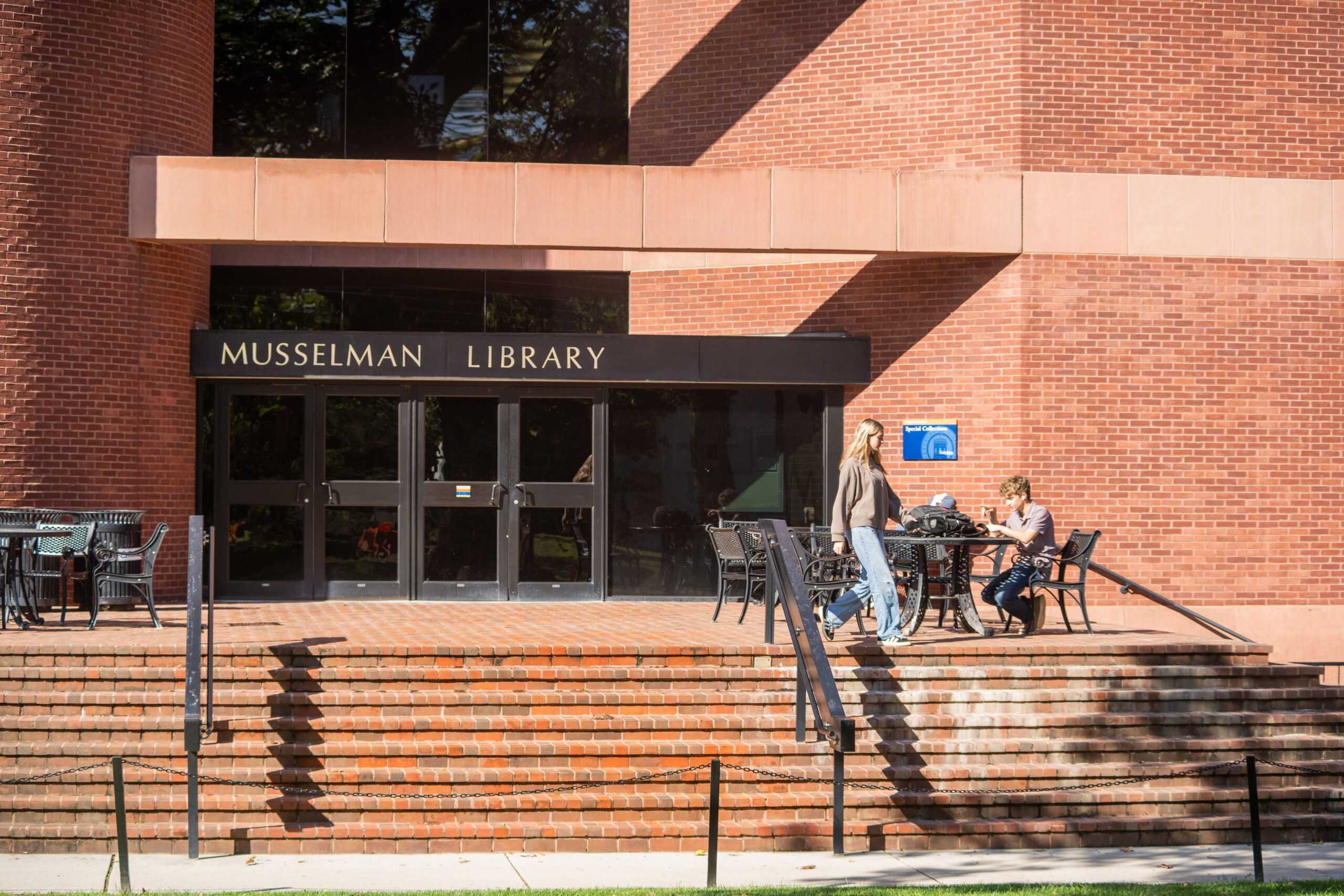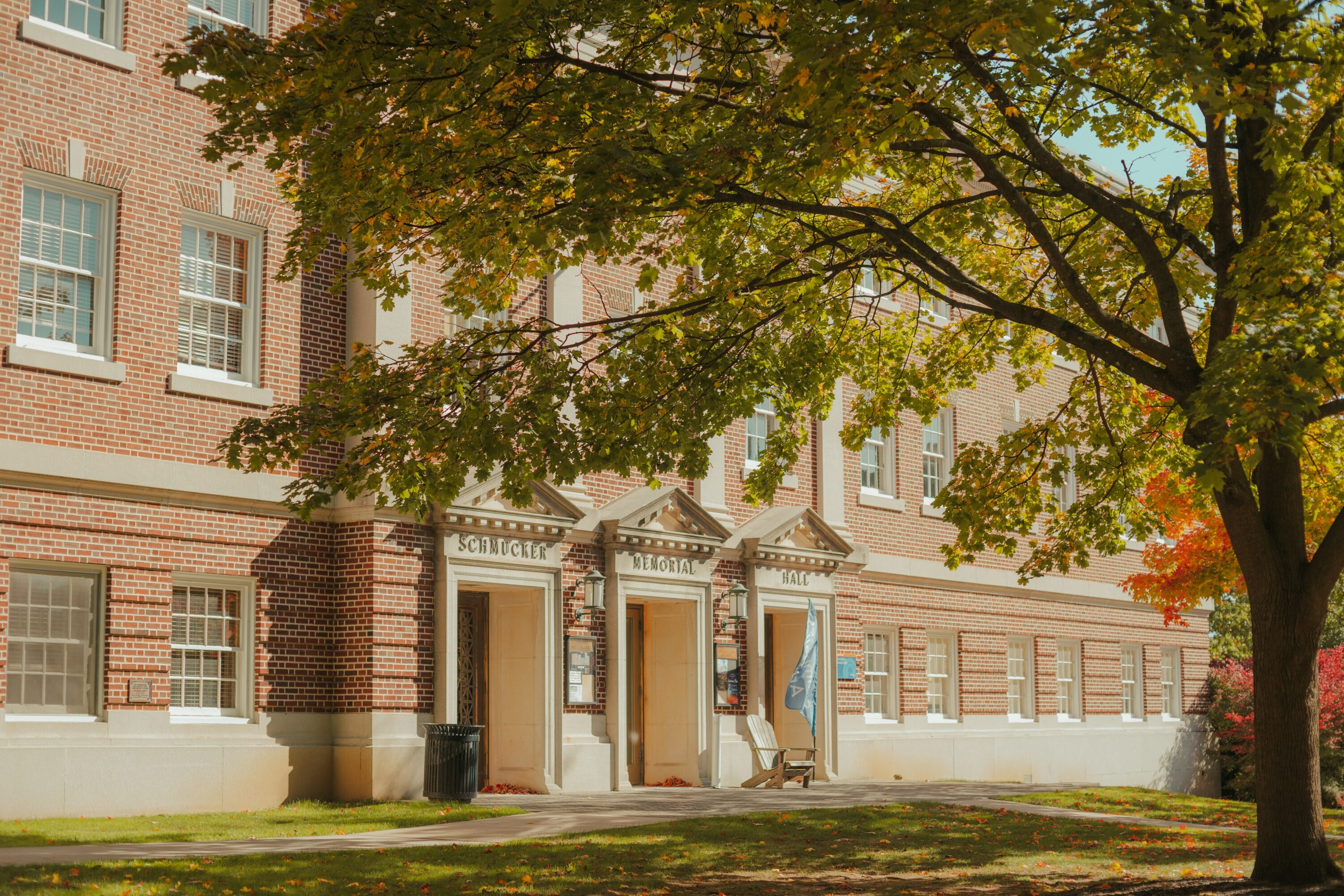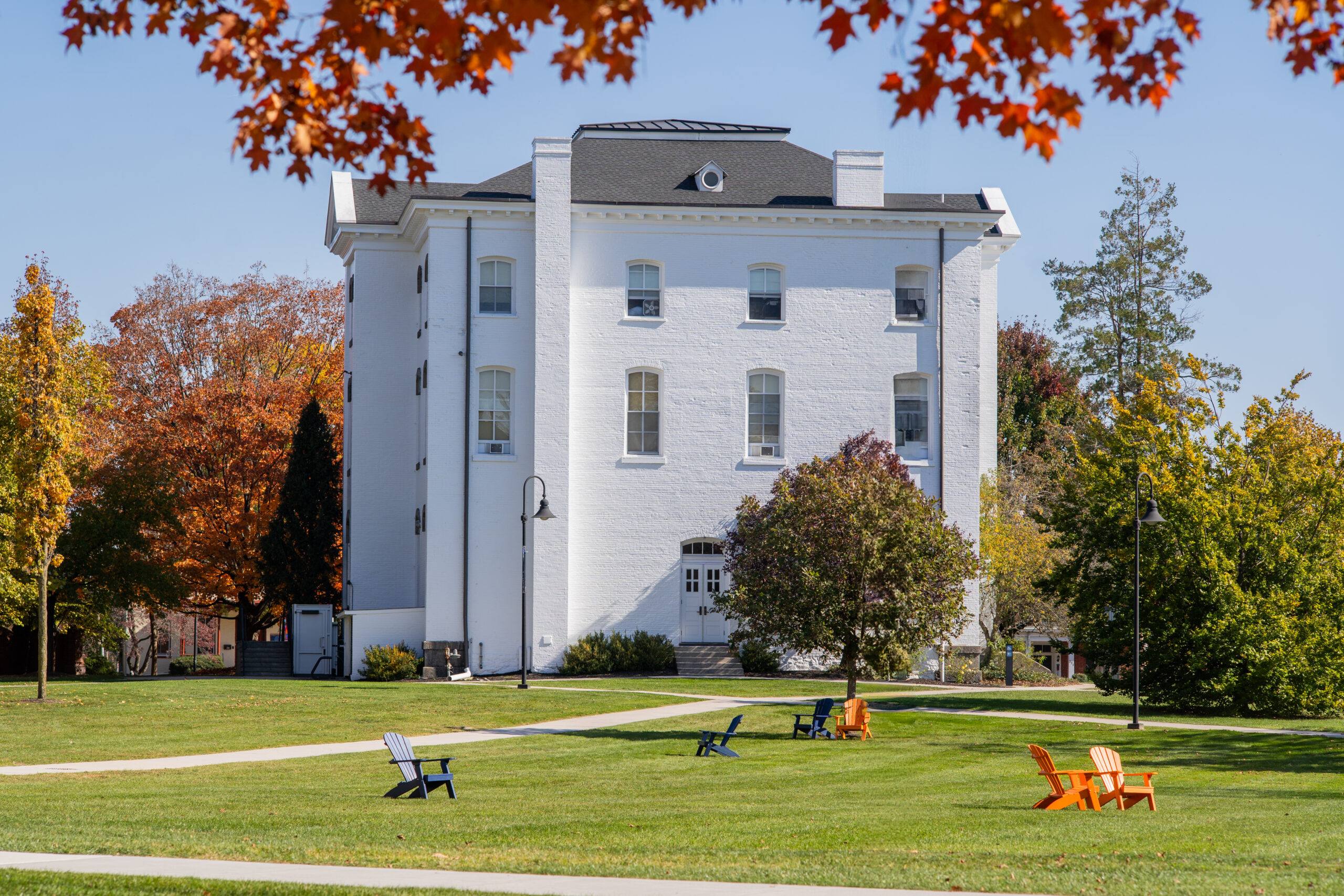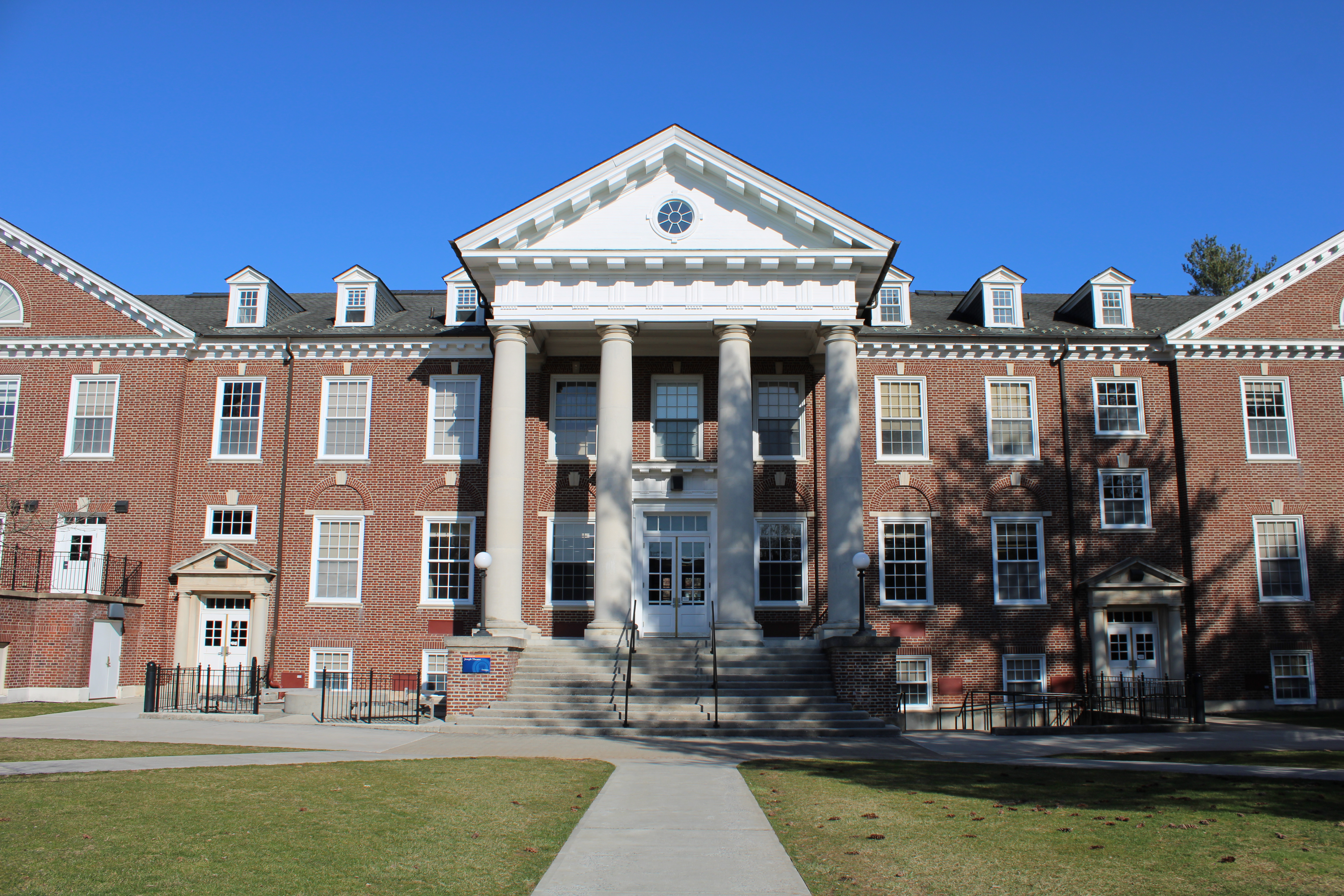Legacies in Stone: The Names Behind Campus Buildings
This article originally appeared on pages 14 and 15 of the No. 5 April 2025 edition of The Gettysburgian magazine
By Sophie Lange, Features Editor & Social Media Manager
Musselman Library
Musselman Library, a beloved study spot for many Gettysburg students, was named after the Emma G. Musselman Foundation, a philanthropic arm of the C.H. Musselman Company, which provided significant funding for its construction beginning in 1979.
The C.H. Musselman Company was established in 1907 by Christian H. Musselman and Emma G. Musselman. Upon moving to Adams County, Pa., the Musselmans began a canning business that specialized in apples, among the county’s most abundant crops. Due to their success and the increased demand for canned goods during the First World War, the C.H. Musselman Company opened several more plants outside of the original in Biglerville, Pa. Additionally, Christian Musselman established a positive relationship with both his employees and the apple farmers of Adams County during his time as the company president.
Inspired by his close friend, Milton Hershey of the iconic Hershey Chocolate Company, Christian Musselman established a charitable component of his company, named then the Musselman Foundation, to benefit the Adams County communities where the canning plants were located. It was officially established in 1939 with the couple’s investment of $35,000.
In 1955, 11 years after her husband’s death, Emma Musselman established the Emma G. Musselman Foundation. The goal of her foundation was to expand the positive work her husband began with an additional focus on educational, literary and scientific purposes, and it extended beyond the communities where Musselman plants were located to reach all of Adams County and beyond. In addition to the Musselman Library, the Emma G. Musselman Foundation also funded the construction of Musselman Stadium, Musselman Hall and Hauser Field House.

Musselman Library (William Oehler/The Gettysburgian)
Schmucker Hall
Schmucker Hall, which houses many music and art classes on campus, was named for Samuel Simon Schmucker, the founder of Gettysburg College. Born in Hagerstown, Md., to a prominent Lutheran family in 1799, he began his studies at York Academy in 1809 before entering the University of Pennsylvania at age 15. Afterward, he returned to York Academy for a brief period of time as a teacher before undertaking a missionary trip, visiting both Ohio and Kentucky. He then moved on to the Princeton Theological Seminary and was ordained as a Lutheran minister in 1820.
Schmucker had a significant impact on Lutheranism during his lifetime, as he assisted in the organization of the General Synod in 1820 by writing both its constitution and hymnal and founded the Lutheran Theological Seminary, the first in the United States, here in Gettysburg in 1826. He became the first president and was a member of its faculty for nearly 40 years. During his life, Schmucker advocated for the education of women and people of color, founding schools for girls and admitting the first black student to the Lutheran Theological Seminary in 1837. He also likely sheltered individuals fleeing slavery through the Underground Railroad.
His rise to fame came from his devotion to ecumenicalism, which is the promotion of unity and collaboration among individuals of different Christian denominations. One of the most prominent examples of this is his membership on the board of trustees of Dickinson College in Carlisle, Pa., which was largely Presbyterian at the time, beginning in 1828. He served on the board until 1832 when Dickinson temporarily closed its doors. Directly following, he founded Gettysburg College, then known as Pennsylvania College, on whose board he remained until his death in 1873.

Schmucker Hall (Borna Ganji/The Gettysburgian)
Stevens Hall
Stevens Hall, a dorm situated on the campus’s East Quad, was named for Thaddeus Stevens, an American politician and abolitionist who would spend much of his career defending the rights of freedmen. Born in Vermont in 1792, Stevens would eventually pass the Maryland bar before moving to Gettysburg, where he would begin practicing law in 1816. After witnessing the effects of an oppressive system of enslavement, he developed a vehement hatred of the institution and defended many individuals caught fleeing slavery at no cost. He was also instrumental in the passing of the 13th and 14th Amendments of the U.S. Constitution, which abolished slavery and ensured equal protection for individuals who were formerly enslaved respectively, after being elected to Congress in 1848.
Stevens was also a vocal supporter of education and assisted in obtaining the charter for Pennsylvania College in 1832. Additionally, he sold the College land and procured funds from the state in 1834 to ensure that Pennsylvania Hall, then the school’s first and only building, could be built. He acted as a trustee of the college until his death. Beyond his work for Gettysburg College, Stevens protected Pennsylvania’s public school system, one of the first to provide a free education, with a speech so moving that the members of the state legislature not only left the system intact but also cheered.

Stevens Hall, photographed in fall 2024. (William Oehler/The Gettysburgian)
Breidenbaugh Hall
Breidenbaugh Hall, home of several departments including English and East Asian studies, was named after Edward Swoyer Breidenbaugh, a professor and the chairman of chemistry and mineralogy at Gettysburg College. Born in 1849, Breidenbaugh was the son of a Lutheran minister and initially aimed to become one himself before a condition affecting his throat forced him to pursue another path. At age 15, he began attending Pennsylvania College and graduated four years later, at which point he entered the Lutheran Theological Seminary before discovering that he would be unable to preach due to his throat affliction. He ended up studying chemistry at the Sheffield Scientific School of Yale College, and he subsequently became a professor of natural science at Carthage College in Illinois after his graduation. He returned to Pennsylvania College as a chemistry professor in 1874.
During his time as both a student and professor, Breidenbaugh was a very active member of the college community. He was a member of many campus organizations, including the Linnean Society, which was Gettysburg’s first club, Phi Beta Kappa and the Xi Chapter of Phi Gamma Delta. He was well-loved by his students, whom he affectionately referred to as “his boys,” and in turn, they called him “Breidie.” Although he allegedly received more financially advantageous offers to teach at Yale and the University of Pennsylvania, Breidenbaugh continued to teach at Gettysburg beyond his retirement and until his death in 1926.

Breidenbaugh Hall. (Annie Bolenbaugh/The Gettysburgian)

April 10, 2025
Thank you most sincerely for bringing forward the men who were the roots of establishing the oldest Lutheran college in the country. It’s a shame the college has drifted from a solid working relationship with the Lutheran church. And, why not is there a weekly protestant service? I’m certain the Lutheran and other clergy in town would be available to provide weekly services. An interesting spinoff of the college founders is that they built the “College Church” on Chambersburg Street, Christ Church and current pastor is GBURG alum Steve Herr, son Josh is on basketball team. Steve is acknowledged expert on Lutheran church history and I’m sure would be available for presentations on the church’s role during Civil War.
Again, thanks for reminding us of the good people who created a wonderful institution.